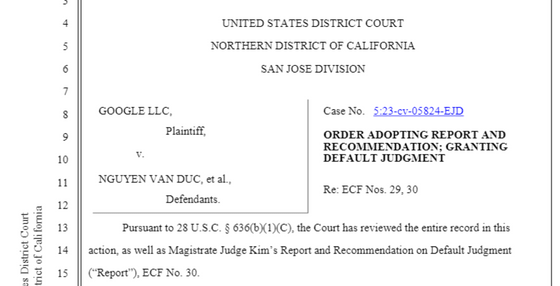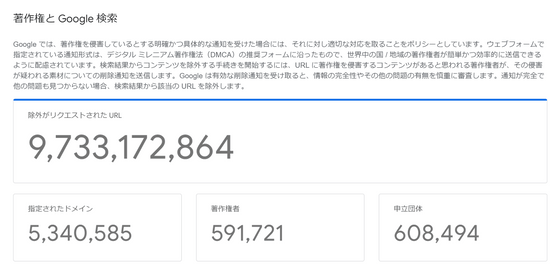Google wins lawsuit against SEO who abused DMCA to remove competing services from search results

A California federal court has issued an injunction barring two people from submitting false DMCA notices and creating new Google accounts after they allegedly used the Digital Millennium Copyright Act (DMCA) to get competing services removed from Google search results without legitimate rights to do so.
ORDER ADOPTING 30 REPORT AND RECOMMENDATION; GRANTING 29 MOTION FOR DEFAULT JUDGMENT for Google LLC v. Nguyen et al :: Justia Dockets & Filings

Google Wins Lawsuit Against Scammers Who 'Weaponized' DMCA Takedowns * TorrentFreak
https://torrentfreak.com/google-wins-lawsuit-against-scammers-who-weaponized-dmca-takedowns-240930/
The DMCA is a law designed to protect copyright holders from copyright infringement on the Internet, and states that online service providers are not held liable for hosting content if they promptly remove it when a copyright holder notifies them that the content is infringing.
Since the DMCA was enacted, Google has received approximately 9.7 billion requests, and Google disables content based on those requests through a semi-automated process.

While the majority of DMCA requests are from legitimate rights holders, some people take advantage of the fact that the content they request is almost automatically removed in order to request the services of competitors and relatively improve the search ranking of their own services. In November 2023, Google filed a lawsuit against 22 particularly malicious individuals.
Google sues 22 people who used 65 Google accounts to abuse the DMCA and request removal of approximately 620,000 URLs from search results - GIGAZINE

Of the 22, only two are known to be identified: Nguyen Van Duc and Pham Van Tien, both of whom live in Vietnam. The remaining 20 are unknown but are believed to be collaborators of Nguyen and Pham. In particular, Nguyen uploaded a video to YouTube titled 'How to get to the top of Google's search results in 3 minutes with a fake DMCA takedown request,' in which he detailed malicious SEO (search engine optimization) techniques using takedown requests.
In this case, the defendants, believed to be based in Vietnam, were summoned via Gmail account and SMS but did not appear in court, and Google requested a default judgment, stating that it had 'no other legal recourse to stop their misconduct.' In the document requesting the trial, Google pointed out that 'the defendants have used Google's DMCA notice and takedown system as a 'weapon' to force the removal of our competitors' legitimate content based on false allegations, rather than for its intended purpose of quickly removing content that is alleged to be infringing copyright.'
Google also did not seek damages, citing its 'purpose being to end the misconduct, not monetary damages,' and instead sought an injunction prohibiting the defendants from filing false DMCA requests or creating new Google accounts in the future.
On September 27, 2024, the court ruled in favor of Google, finding that the defendants' DMCA filings were false. It then issued an injunction prohibiting the two defendants from:
1: Submitting copyright infringement or removal requests to Google based on false claims of copyright ownership
2. Creating or attempting to create a Google account
3. Use any Google product or service to promote the Defendant's website or products
4. Use Google products or services to harm or attempt to harm third parties, including, but not limited to, Google search advertising customers.
5. Aiding, assisting or encouraging any other person or entity to engage in or carry out any of the acts listed above in 1 through 4.
Related Posts:
in Web Service, Posted by log1d_ts






